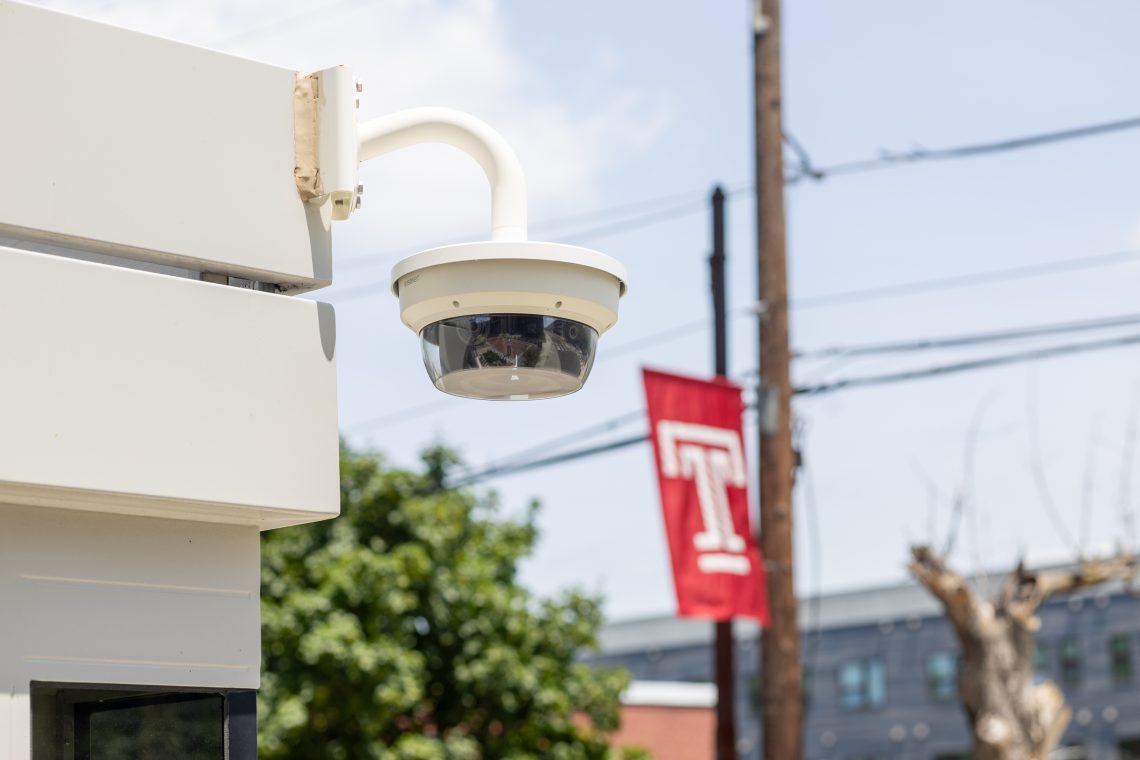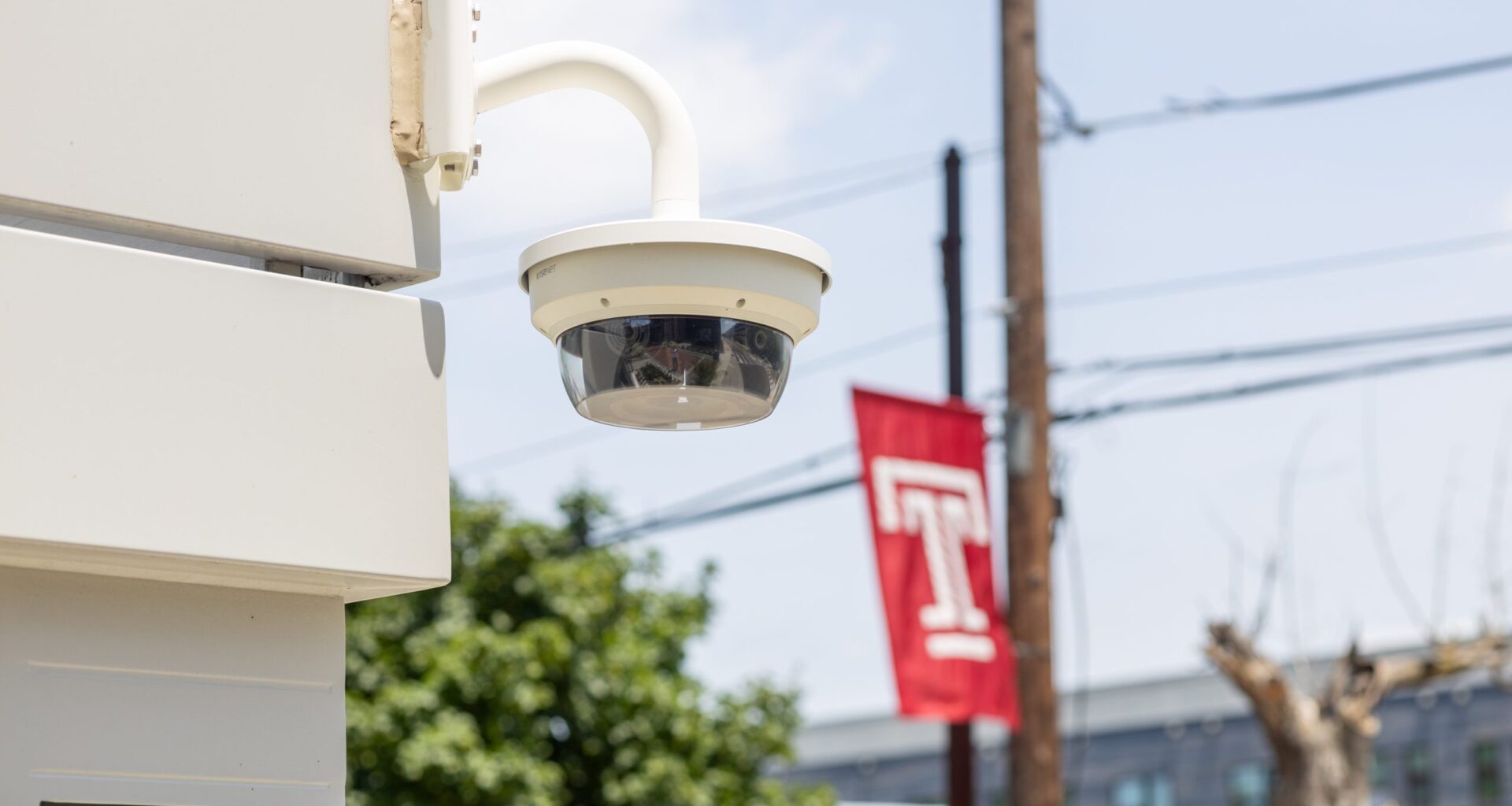 Flock Safety cameras were installed around Main Campus in 2024, but some have concerns with their usage of data. | AIDAN GALLO / THE TEMPLE NEWS
Flock Safety cameras were installed around Main Campus in 2024, but some have concerns with their usage of data. | AIDAN GALLO / THE TEMPLE NEWS
Since Temple’s Department of Public Safety placed License Plate Reader technology on Main Campus in 2024, the security equipment has helped Temple University Police Department to apprehend suspects in multiple criminal cases, including the arrest of a man wanted in three states for burglaries.
Alongside these results, the technology has been subject to numerous ethical concerns regarding the distribution and use of information captured by the technology, recently through a case in May, where alike a case in May where a Texas woman was tracked down using an LPR after she was reported missing and self-administered an abortion.
Temple’s LPRs were designed by Flock Safety, the same company involved in the missing woman’s case. They are security cameras that automatically read and record data on vehicles within their range. The technology scans license plates and records the make and model of the vehicle, which helps law enforcement flag vehicles wanted in connection to crimes listed in Flock Safety’s national database.
“Without this technology it would be almost impossible for us to know when people are driving through,” said Vice President for Public Safety Jennifer Griffin.
The Flock Safety LPRs can connect to a nationwide database of cameras used by police departments nationwide. This allows cooperation between different law enforcement departments who use the technology when criminals cross multiple jurisdictions.
“We frequently will get somebody who drives through campus in a stolen car,” Griffin said. “The car is flagged and we give that information to the police agency that is handling it.”
Departments can also choose to connect their LPR data to the “national lookup” system, a network where police can look up a complete license plate and find all results within the shared database. This system is designed to help with “far-reaching crimes,” according to Flock Safety, and enables more efficient tracking of suspected vehicles in serious crimes.
Departments must input a specific reason for each search made in the database, and the search data is preserved in a network audit for each jurisdiction for transparency, which Temple publicly shares. Flock Safety has emphasized that these national databases are secure, shared only with police departments across the country.
“Private customers never have access to law enforcement data,” wrote Garrett Langley, CEO and co-founder of Flock Safety, in a statement on the Flock Safety website in June.
Flock Safety and its network of LPRs came into national attention after concerns were raised over how the data is used across state lines for prosecuting suspects. In early May, a woman from Texas went missing and self-administered an abortion. Worried for her safety, her family contacted local police who subsequently initiated a nationwide search across the Flock Safety LPR database to find hits on the woman’s vehicle.
The search went out to around 6,800 different Flock Safety networks and 83,000 cameras across the country, including states like Illinois, where abortion is protected. When conducting the search, the reasoning Johnson County police gave in official documentation was “Had an abortion, search for female,” according to 404 media, an outlet of independent journalists founded by former members of Vice magazine’s Motherboard section.
While Johnson County police said the Flock Safety search was related to a missing person case and not solely a result of the woman’s abortion, the nature and scale of law enforcement’s search for her drew concern about the LPR technology and how the automated nature of the systems affect the public perception of police activity.
“Ideally in a community you want to be able to know who are the police, who are the emergency service workers, I think that’s the type of thing that creates a community where you can trust those authority figures,” said Andrew Van Antwerp, a senior media studies and production major, who raised concerned online with Temple’s use of Flock Safety LPRs. “This type of technology kinda makes it into a faceless kind of conglomerate.”
Griffin believes that educating yourself is the most important thing when engaging with stories surrounding LPRs, in order to combat the spread of misinformation concerning the technology.
Some states, like California, do not allow the sharing of certain law enforcement data like LPRs across state borders, while other states, like Illinois, limit what can be searched for using the technology within its borders. For each case, Flock Safety limits the functionality of their database and lookup systems to accommodate state laws.
However, in January 2024, the Electronic Frontier Foundation and the American Civil Liberties Union reported instances when these laws were ignored and multiple law enforcement agencies disobeyed state laws and shared data from LPRs out of state.
Temple currently has a public transparency portal on the Flock Safety website, showing what and where LPR data is being shared from cameras on Temple’s campus and what policies Temple holds itself to. The portal also states that Temple prohibits use of Flock Safety technology for immigration enforcement and doesn’t use facial recognition technology.
Antwerp stressed the importance of spreading awareness about these events and TUPD’s usage of the technology on campus.
“Talk to the people in charge and come to them with cases that are serious, and kind of know our stuff,” said Antwerp, “I think that’s a pretty effective thing to do.”
